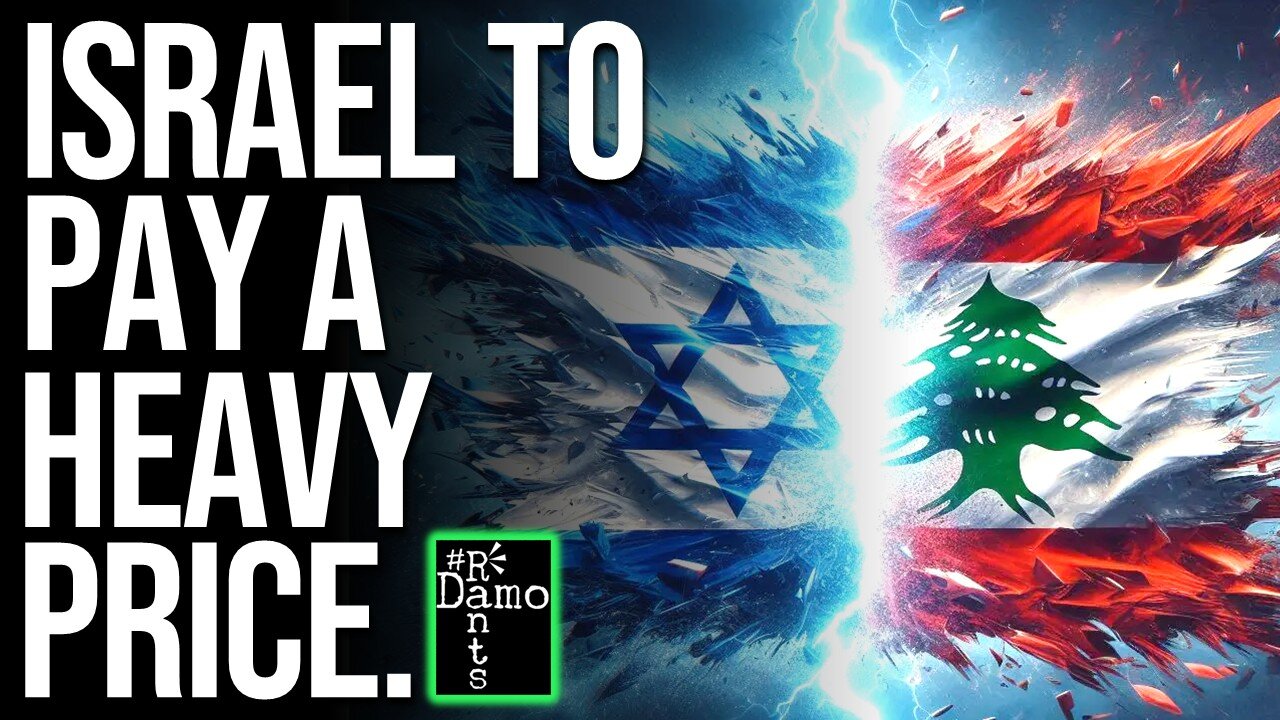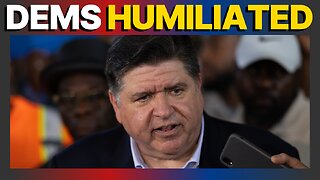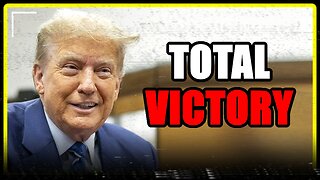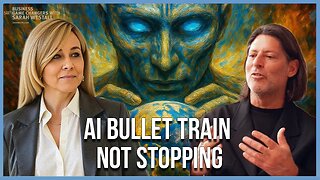Premium Only Content

Netanyahu Thought He Had Lebanon Trapped - Hezbollah Decided Otherwise
Right, so have matters finally come to a head in Lebanon between Hezbollah and the Lebanese government of Joseph Aoun over the ongoing invasion and attacks by Israel on their country? It looks like they might have. The Lebanese cabinet have issued a decision aimed at enforcing a full state monopoly on weapons by year’s end, effectively mandating the full disarmament of Hezbollah, exactly what Israel wanted, despite Israel still attacking areas of southern Lebanon. As you might imagine, its not gone down well. Within twenty-four hours, Hezbollah issued a blistering rejection, calling the decree a "grave sin" and vowing to treat it as though it "does not exist.” Hezbollah’s resistance wing, long regarded by its supporters as Lebanon’s shield against Israeli aggression, but recognised as a terror organisation in many parts of the West, notably Israeli supporting parts of the West, I’m sure there can’t possibly be a correlation, now finds itself at the centre of an escalating confrontation not just with Tel Aviv, but with the Lebanese state itself. The crisis lays bare a fundamental contradiction: how can a state demand disarmament from the only force that has successfully deterred its most persistent and powerful enemy, while simultaneously failing to defend its own people or territory from that enemy?
Right, so as always with such subject matter, caveat at the start that I’m not offering in any way shape or form my support for Hezbollah in this piece, that is illegal in the UK and with the way things are under Starmer, making that clear at the start is just being prudent. Nevertheless, the Lebanese government’s disarmament initiative is not going down well with its own people, it is not being seen as a sovereign expression of national will, but a capitulation to foreign pressure—chiefly from the United States and Israel—and that Hezbollah’s defiant rejection is both a rational act of survival and a defence of Lebanon’s right to resist occupation.
Hezbollah was founded in the midst of the 1982 Israeli invasion and occupation of southern Lebanon, much as we’ve been seeing something of a rerun of over the last 18 months to two years, since Hezbollah basically came out in support of the people of Gaza amidst Israel’s genocide. The Lebanese state, fractured by civil war and absent from the south, had left a vacuum that Hezbollah came to fill after it formed—providing not only armed resistance, but also social services, education, and political representation. The Israeli invasion, which led to the deaths of tens of thousands and the occupation of southern Lebanon until 2000, radicalised segments of the Shi’a population, who found in Hezbollah a force that could resist Israeli domination where the state and traditional parties had failed.
Hezbollah’s roots also lie in the failures of the Lebanese sectarian system and the historic marginalisation of southern communities. The South Lebanon Army (SLA), a proxy of Israeli forces, terrorised southern civilians, many of whom turned to Hezbollah for protection, hence their former presence in the south. Hezbollah’s subsequent military and political victories, particularly Israel’s withdrawal in 2000 and the 2006 war, redefined deterrence in the region. The 2006 war, in which Hezbollah launched over 4,000 rockets into Israel and fought the IDF to a standstill, marked the first time in decades that an Arab force had prevented Israeli military superiority from translating into political gains.
Importantly, Hezbollah did not emerge solely as an armed group. It built schools, hospitals, and a vast network of social welfare institutions. In the absence of a functioning state, it became a de facto authority in many areas. Its legitimacy was not only derived from resistance but from delivery. While critics accuse Hezbollah of operating a state within a state, its supporters argue that it simply filled the void left by state collapse.
The Lebanese cabinet’s decision, backed by President Joseph Aoun and Prime Minister Nawaf Salam, mirrors long-standing demands from the United States and Israel. They have capitulated on the face of it. US officials have openly linked Israeli withdrawal from Lebanese territory to the disarmament of Hezbollah, framing resistance as the primary obstacle to peace. According to The Cradle, the United States has declared there will be no Israeli de-escalation unless Hezbollah is disarmed, effectively conditioning peace on the surrender of resistance.
Joseph Aoun reinforced this narrative a few days later, urging Hezbollah to “bet on the state alone” and warning that its sacrifices would go to waste if it did not yield to state authority. Aoun, who was appointed following a Western-backed compromise, has long been perceived as a figure aligned with international expectations and US strategic preferences. Prime Minister Nawaf Salam, a former judge at the International Court of Justice and a favourite of Western capitals, has also promoted a vision of governance that privileges state institutions—regardless of their current capacity.
The decree must therefore be understood less as an act of autonomous national strategy, and more as a product of intense international pressure, aimed at severing Lebanon from the Axis of Resistance, seen as Iran’s network in the Middle East. The condition that peace with Israel can only occur if Hezbollah is neutralised renders the so-called peace process indistinguishable from a process of dismantlement, which would be entirely in keeping with that western designation for Hezbollah as a terror group.
In response, Hezbollah Secretary General Sheikh Naim Qassem made clear that the resistance “will never surrender or hand over its weapons.” He has repeatedly framed the issue not as internal insubordination, but as a principled refusal to expose Lebanon to domination. Hezbollah’s leadership insists that disarming in the current context—amid ongoing Israeli airstrikes, assassinations, and incursions—would constitute not reform, but suicide.
Hezbollah has previously shown flexibility in allowing state processes to unfold. It supported the 2008 Doha Agreement to resolve armed conflict with March 14 factions. It entered unity governments, even when it disagreed with them. It stood down its military capacity during periods of national dialogue and has done so for several months now to allow the Lebanese state to take a lead towards getting Israel out of state territory. But its red line has always been surrender under duress. The demand to disarm while Israeli bombs continue to fall is, in Hezbollah’s view, both cowardly and strategically insane. If you were being attacked and were told the only way you could end it was to disarm yourself before your opponent does, would you? Or does it just leave you defenceless? It relies on you having to trust your opponent to do likewise doesn’t it? And when has Israel shown such restraint and respect for international norms as that?
Therefore it really shouldn’t have come as a surprise to anyone, when on 5 August, as reported by France 24, Hezbollah warned that any intensification of Israeli operations would be met with missile retaliation into northern Israel. One day later, Hezbollah officially declared the cabinet’s disarmament plan a “grave sin” and vowed to disregard it entirely. This was a direct and formal rejection of state policy. Hezbollah’s stance is rooted in the belief that resistance must not be dismantled while occupation, aggression, and international hypocrisy remain intact.
In its official communications and aligned media, Hezbollah denounced the decree as a foreign-imposed surrender document. As reported by The Cradle, the group views the policy as an instrument of Western control, designed not to strengthen the Lebanese state, but to weaken its only effective line of defence against Israel.
Perhaps the most damning indictment of the disarmament decree is its timing. In the days preceding the policy’s announcement, Israel intensified its bombardment of southern Lebanon. On 29 July, an Israeli drone strike killed one civilian and injured four others in Bint Jbeil, despite a nominal ceasefire. On 30 July, Israeli warplanes struck multiple sites in Nabatieh and Marjayoun, escalating tensions and spreading fear across the south.
The Israeli government has made no secret of its aim to “degrade Hezbollah’s capabilities,” and officials have stated that airstrikes will continue until the group is disarmed. These attacks occur with impunity, in violation of Lebanese sovereignty and international law. In this context, calls for Hezbollah to disarm appear not just misguided, but grotesque. They reinforce Qassem’s core argument: Israel demands Hezbollah’s disarmament not because it undermines peace, but because it threatens Israel’s impunity. The resistance’s very effectiveness is what makes it intolerable to Tel Aviv and Washington. Thus, to disarm now would be to reward aggression with compliance.
The Lebanese government’s silence on these violations only further erodes its credibility. For many Lebanese, it is not Hezbollah who undermines the state. It is the state who abandons its people to foreign violence.
In the wake of the disarmament decree, protests erupted across Beirut and southern Lebanon, with demonstrators waving Hezbollah flags and chanting slogans in support of the resistance. Footage from PressTV captured tens of thousands of citizens rallying behind the message that the resistance is not a militia outside the law—it is the only defence Lebanon has left. Hezbollah’s support base is no longer confined to Shi’a strongholds; its legitimacy now extends to Sunni and Christian communities disillusioned by state failure and Israeli aggression.
These protests reflect a deeper crisis of confidence in state institutions. The call for Hezbollah to “trust the state” rings hollow when that state has consistently failed to deliver basic services, protect sovereignty, or stand up to foreign threats. The army, though respected, remains underfunded and divided. The police are often absent or politically compromised. In this vacuum, Hezbollah’s military wing is not seen as a threat, but a necessity by much of the population, whatever might be thought of them outside Lebanon.
One of the least acknowledged yet most consequential failures in this crisis is that of the United Nations Interim Force in Lebanon (UNIFIL). Tasked with monitoring the cessation of hostilities under UN Security Council Resolution 1701, UNIFIL has repeatedly failed to prevent Israeli violations of Lebanese sovereignty. Since October 2023, Israel has launched hundreds of airstrikes and artillery shells into southern Lebanon. UNIFIL’s response has been tepid at best—limited to occasional statements of concern, vague calls for de-escalation, and a complete refusal to identify the aggressor. These are brave men and women, tasked to do an onerous job, but they report to the UN, and the UN sits on its hands, so their effectiveness despite the risks to them personally do not amount to an awful lot when the resolution they are tasked with defending is never seemingly held against Israel in any meaningful way.
Hezbollah and many Lebanese civilians view UNIFIL not as a neutral actor, but as a shield for Israeli aggression as a result.
Calls for Hezbollah to “rely on the state” ignore the deeper reality though: Lebanon is a failed state. Since the 2019 financial collapse, Lebanon has lurched from one crisis to the next. Its currency has devalued by over 95 percent. Public sector wages have evaporated. Basic infrastructure—electricity, water, waste collection—has collapsed. The judicial system is paralysed by corruption and external influence. Even the Lebanese Armed Forces, one of the last respected institutions, cannot pay its soldiers without foreign aid.
In such a context, expecting the Lebanese state to act as a guarantor of sovereignty is fantasy. The institutions that would supposedly replace Hezbollah’s military role do not exist in any credible form. The disarmament policy, then, is not a transition to state control—it is an enforced vacuum. It would leave southern Lebanon defenceless against Israeli raids, and expose the entire country to strategic blackmail.
Much of the international pressure on Hezbollah is cloaked in the language of legality. Disarmament is framed as a fulfilment of UN resolutions and the reassertion of state authority. But international law is not applied evenly. Israel, a state in open violation of dozens of UN Security Council resolutions, not least 1701 as applies here and to UNIFIL—faces no consequences. It receives military aid, diplomatic cover, and special status in global forums.
Hezbollah, by contrast, is treated as an outlaw—not just because of what it has done, but because of who it defies. It challenges the US-Israeli regional order. It insists on Lebanon’s right to defend itself. It exposes the contradictions of an international system that punishes resistance but rewards aggression. The attempt to disarm Hezbollah is less about peace, and more about pacification.
At its heart, the debate over Hezbollah’s arms is not a domestic issue. It is a struggle over Lebanon’s future: will it be a sovereign nation with the right to defend itself, or a neutralised client state policed by foreign embassies and hollow institutions? Or perhaps something ripe for Israel to take over next as part of that Greater Israel vision so many Zionists cling to? The Lebanese government’s disarmament decree signals a preference for that client state vision. But the mass mobilisation of citizens, the continued threat of Israeli escalation, and Hezbollah’s stance suggest that surrender will not come easily.
The disarmament debate is often framed as a question of unity and state control. But true unity cannot be built on coercion. And state control means nothing if the state is controlled from abroad. If the Lebanese state wishes to assert authority, it must begin by asserting independence—not by dismantling what amounts to its only functioning defence. Until that happens, Hezbollah will not disarm, it really is that simple.
As it happens it isn’t just in Lebanon that a militant armed force is saying no to their government, it is actually happening in Israel too as figures from the IDF, Mossad, Shin Bet and more have now issued warnings of impending defeat for Israel in Gaza, not through military defeat itself though, but because those doing the fighting are increasingly at odds with what they are fighting for, with many refusing to fight on the basis that they are doing so for no other reason than to keep Netanyahu in power at this point. Took them long enough didn’t it? Get all the details of that story in this video recommendation here as your suggested next watch.
Please do also hit like, share and subscribe if you haven’t done so already so as to ensure you don’t miss out on all new daily content as well as spreading the word and helping to support the channel at the same time which is very much appreciated, holding power to account for ordinary working class people and I will hopefully catch you on the next vid. Cheers folks.
-
 28:46
28:46
DeVory Darkins
13 hours ago $14.38 earnedPritzker HUMILIATED after brutal fact check as Democrat candidate calls for political assassination
16.1K88 -
 19:54
19:54
Forrest Galante
10 hours agoPrivate Tour Of America's Best Marine Animal Facility
28.2K7 -
 9:25
9:25
MattMorseTV
1 day ago $17.63 earnedSupreme Court just DROPPED a NUKE.
26.1K66 -
 13:25
13:25
Nikko Ortiz
1 day agoWorst Karen TikTok Fails
27.2K10 -
 40:24
40:24
The Connect: With Johnny Mitchell
2 days ago $21.88 earnedInside The WORST Drug-Infested Slums Of Medellin, Colombia
68.9K29 -
 4:14
4:14
GritsGG
16 hours ago2 Warzone Easter Eggs! How to Find Them EASILY!
21.4K1 -
 LIVE
LIVE
Lofi Girl
2 years agoSynthwave Radio 🌌 - beats to chill/game to
402 watching -
 1:45:43
1:45:43
Man in America
16 hours agoThe DISTURBING Truth About Parasites — Live Q&A w/ Dr. Jason Dean
88.2K40 -
 7:13:47
7:13:47
SpartakusLIVE
12 hours ago#1 Mountain of Muscle with HUGE Legs saves your weekend from complete BOREDOMNight HYPE
51.6K1 -
 47:42
47:42
Sarah Westall
13 hours agoFreedom or Slavery? AI will Change Everything w/ Trump Senior Advisor Marc Beckman
69.9K16
